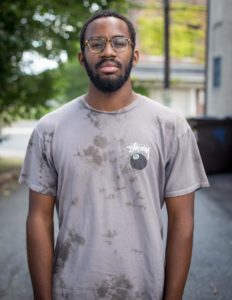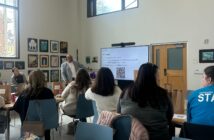
Chester Toye
Rapper T.I.’s response to a question asked by the host of “The Daily Show with Trevor Noah” perfectly explains what may seem like counterproductivity of violent themes in hip-hop.
“I hear you guys saying you want justice,” Noah said. “I hear hip-hop stars and fans and saying, ‘This is not right,’ but then in hip-hop people are talking about guns, people are talking about shooting, people are saying, ‘F–k the police.’ How does this help the dialogue?”
“People need to take into consideration that hip-hop traditionally has always been a reflection of the environment,” T.I. retorted. “So if you want to change the content of the music, change the environment of the artist. And he won’t have such negative things to say.”
T.I.’s response to Noah’s question concisely summed up many of my feelings about the frequent bad-mouthing and misinterpretation about some of the content in hip-hop music.
I was reminded of the constant demonization of hip-hop after coming across a viral video about a mother’s response to hearing the Vince Staples song “Norf Norf.” This mother heard the song on the radio while in the car dropping her children off at school. During the 11 minute, tear-filled video, she notes she normally only listens to Christian radio, but she was listening to a local top hits radio station this particular morning. After explaining the situation, she pulls up the lyrics for the song “Norf Norf” and begins to recite, pausing only to dry her tears, and make statements like, “I can’t believe this stuff is on the radio. This is what our youth is being subjected to.” During the video, she also recites the hook of the song:
“I ain’t never ran from nothing but the police (3x)
From the city where skinny n–gas carry strong heat
Norfside, Long Beach, Norfside, Long Beach”
She sarcastically says, “Let’s just encourage kids to run from the police because that’s OK, right? We wonder why this society is so messed up. Listen to the music.”
I really don’t think Vince is encouraging anyone to run from the police. His lyrics make me ask the questions, “What did he do that he had to run from the police, or what did the police do to him? Why did these things happen in the first place?”
I would also turn this mother’s statement, “We wonder why this society is so messed up. Listen to the music” on its head and into the statement, “We wonder why this music is so messed up. Look at society.”
I personally have no issue with parents being protective over the content their child is consuming, but I would hope they would also take the time to think about the content they find unfit for their children. Not in hopes for them to reconsider whether they should allow their child to consume the content in question, but to avoid simply writing things off as inherently bad or unhealthy without taking the time to see the whole picture.
I agree that this mother probably shouldn’t allow her young kids to listen to songs like “Norf Norf,” but I am disappointed that nowhere in this 11-minute long rant does the mother find the time to shed a tear for the circumstances rapper Vince Staples and many other rappers were born into for them to feel the need to rap about this kind of content.
Before becoming outraged and or annoyed over song lyrics and content, I challenge everyone to think more about the circumstances that had to exist for lyrics in question to be thought of and rapped about in the first place.
In a perfect world, no one would have to carry strong heat, also known as a gun, or run from the police. For many of us, this perfect world exists. This is why it might seem foolish for someone to rap about these things in their music.
For a large portion of the population, however, this perfect world is a fantasy, and music is an opportunity to talk about these hardships as opposed to continuing to have to live them. While it is a shame these things had to be experienced in the first place, I’m glad hip-hop has reached a place in popular culture that it is forcing people be exposed to the hardships encountered by many Americans.
This music doesn’t need to be swept under the rug and ignored. It needs to be listened to, analyzed and used as a tool to help fix some of the systemic problems existing in many of our nation’s communities.
_
Chester Toye, ’19G, is a columnist for The Brown and White. He can be reached at cvt217@lehigh.edu.





Comment policy
Comments posted to The Brown and White website are reviewed by a moderator before being approved. Incendiary speech or harassing language, including comments targeted at individuals, may be deemed unacceptable and not published. Spam and other soliciting will also be declined.
The Brown and White also reserves the right to not publish entirely anonymous comments.